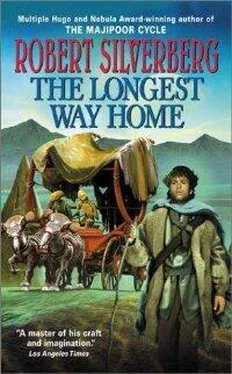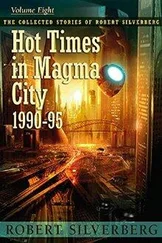Silently, he obeyed. Any kind of resistance or even a show of reluctance to cooperate was likely to prove foolhardy. They conveyed him down an inner avenue between rows of the little huts and delivered him to one of the larger buildings, which, Joseph saw, was provided with an attached and fenced-in yard of considerable size: a compound for prisoners, he supposed. Wordlessly they directed him within.
It was a long windowless structure, a kind of dormitory, dark inside except for a few feeble lamps. The air inside was stale-smelling and stifling. Simple iron-framed cots were arranged along the walls. Most were empty, though half a dozen were occupied by Folk, all of them men, most of them sitting slumped on the edges of their cots staring off into nothingness. Joseph saw no one among them who might have been a Master. A door on the right led to the fenced-in outside area.
“This will be yours,” said one of his guards, indicating an empty cot. Wordlessly he held out his hand for Joseph’s pack, and Joseph surrendered it without offering objection, though he bitterly regretted being parted from his utility case and everything else that had accompanied him through all these many months of wandering. He owned so little that he could carry it all in that single pack, and now they were taking it away from him. The officer sniffed at the pack and made a face: the last of the wrapped meat was within, probably beginning to go bad. “They will come to speak with you in a little while,” the guard said, and both men turned and went out, taking the pack with them.
Not a single one of the slump-shouldered Folkish men sitting on the cots looked in his direction. They seemed as incurious about him as the cots themselves. Joseph wondered how long it was that they had been interned here, and what had been done to them during their stay.
After a little while he went out into the adjoining yard. It was a huge, barren, dreary place, nothing but bare dusty sun-baked ground, not even a blade of grass. At the far end Joseph saw what looked like a brick-walled washhouse and a latrine. There were some more Folkish men in the yard, each one keeping off by himself in a little zone of isolation, holding himself apart from any of the others, immobile, looking at nothing, almost as though he was unaware that anyone else was with him out there. All of them stood in a manner that gave them the same odd slumped, defeated look as the men on the cots inside. Joseph was surprised to see three Indigenes also, a little silent group huddled together in one corner. He wondered how this incomprehensible civil war could have managed to involve Indigenes. He understood nothing. But he had been on his own for more than a year, he calculated: from mid-summer in High Manza to late summer, or even early autumn, wherever he was now. A great deal must have happened in all that time, and no one here was going to explain it to him.
There seemed to be no harm in trying to find out, though. He went up to the nearest of the Folkers, who paid no more attention to the approaching Joseph than a blind man would, and said softly, “Pardon me, but—”
The man glared at Joseph for an instant, only an instant, a quick, hot, furious glare. Then he turned away.
“I’m sorry,” Joseph said bewilderedly. It did not seem at all remarkable to him just then to be apologizing to a Folker. “I’m new here. I only wanted to ask you a few things about—”
The man shook his head. He seemed both angry and frightened. He moved away.
Joseph got the same reaction from the next two men that he tried. And when he went toward the trio of Indigenes, they drifted silently away from him the way those little hopping creatures in the field had. He gave the project up at that point. It is not the done thing here, Joseph realized, to have conversations with your fellow inmates. Perhaps conversation was prohibited; perhaps it was just risky. You never knew who might be a spy. But again he wondered: spying for whom? For whom?
Noon came and went. In early afternoon three Folkish orderlies arrived with food for the prisoners’ meals, carrying it in big metal tubs slung between two sticks: cold gluey gruel, some sort of stewed unidentifiable meat that had the flavor of old cardboard, hard musty bread that was mostly crust. The inmates lined up and sparse portions were ladled out to them on tin plates. They were given wooden spoons to use. Hungry as he was, Joseph found it hard to eat very much. He forced himself.
The hours went by. The sun was strong, the air humid. He saw armed sentries marching about outside the wire-mesh fence. Within the compound no one spoke a word to anyone else. At sundown one of the guards blew a whistle and everyone who was in the yard went shuffling inside, each to his own cot. Joseph had forgotten which cot was his: he picked one at random in a row of empty ones, half hoping that someone else would challenge his taking of it so that he could at least hear the sound of a human voice again, but no one raised any objection to his choice. He sprawled out on it for a while; then, not finding it comfortable to lie on the thin, hard mattress, he sat up like the others, slumped on the edge of his cot. When it was dark the orderlies returned with another meal, which turned out to be the same things as in the earlier one only in smaller portions. Joseph could not bring himself to eat very much of it. He hardly slept at all.
The second day went by very much like the first. The food was, if anything, just a little worse, and there was even less of it. The silence in the yard grew so intense that it began to resound within Joseph’s head like a trumpet-call. For hour after hour he paced along the fenced border of the compound, measuring off its dimensions in footsteps. He envisioned his spending the next thirty years, or the next fifty, doing nothing but that. But of course he would not last fifty years on the sort of food that they served the prisoners here.
The question is, Joseph thought, will I starve to death before I go insane, or afterward?
It seemed foolish even to think of attempting to escape. And trying to stand upon his rights as a Master was an even sillier idea. He had no rights as a Master, certainly not here, perhaps not anywhere any more. More likely than not they would kill him outright if they found out who he really was. Better to be thought to be a vagabond lunatic, he thought, than the scion of one of the Great Houses of Helikis. But why was he here? What was the point of rounding up vagabond lunatics? Did they mean simply to intern their prisoners purely for the sake of interning them, so that they would not intrude on whatever military action might be going on in this part of the world? Why not just shoot us, then? he wondered. Perhaps they would; perhaps they were merely waiting for the order to come from some other camp. Joseph began to think he might almost prefer to be shot to having to spend an indefinite length of time here.
But on the third morning a guard entered the compound and indicated, in the curt wordless way that seemed to be the usual way of communicating with prisoners in this place, that Joseph was to follow him.
The guard marched him up the middle of the camp, turned left down an aisle of important-looking structures that were guarded by strutting sentries and appeared more solidly constructed than those Joseph had seen so far, and delivered him to a smallish building at the end of the row.
A Folkish officer with an air of great confidence and power about him that reminded Joseph of Governor Stappin of Eysar Haven was sitting behind a desk that had the contents of Joseph’s pack spread out on it: his utility case, his books, his flask, and all the rest. His shoulders were immensely broad, even as Folkish shoulders went, and he had his shirt open to the waist in the muggy heat, revealing a dense, curling thatch of reddish-gold hair. The hair of the officer’s head was of the same color and curling texture, but it was receding badly, laying bare the great shining dome of his forehead.
Читать дальше












